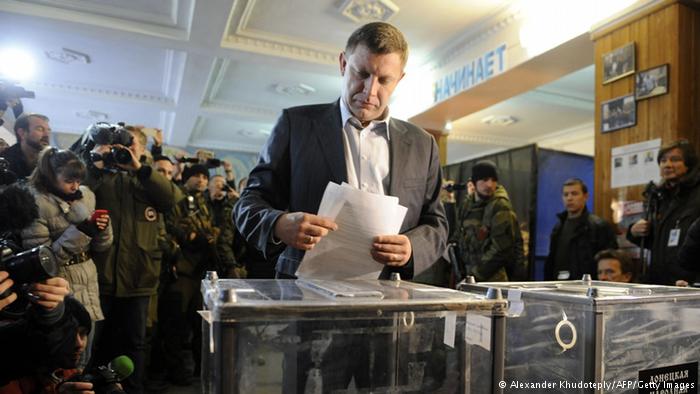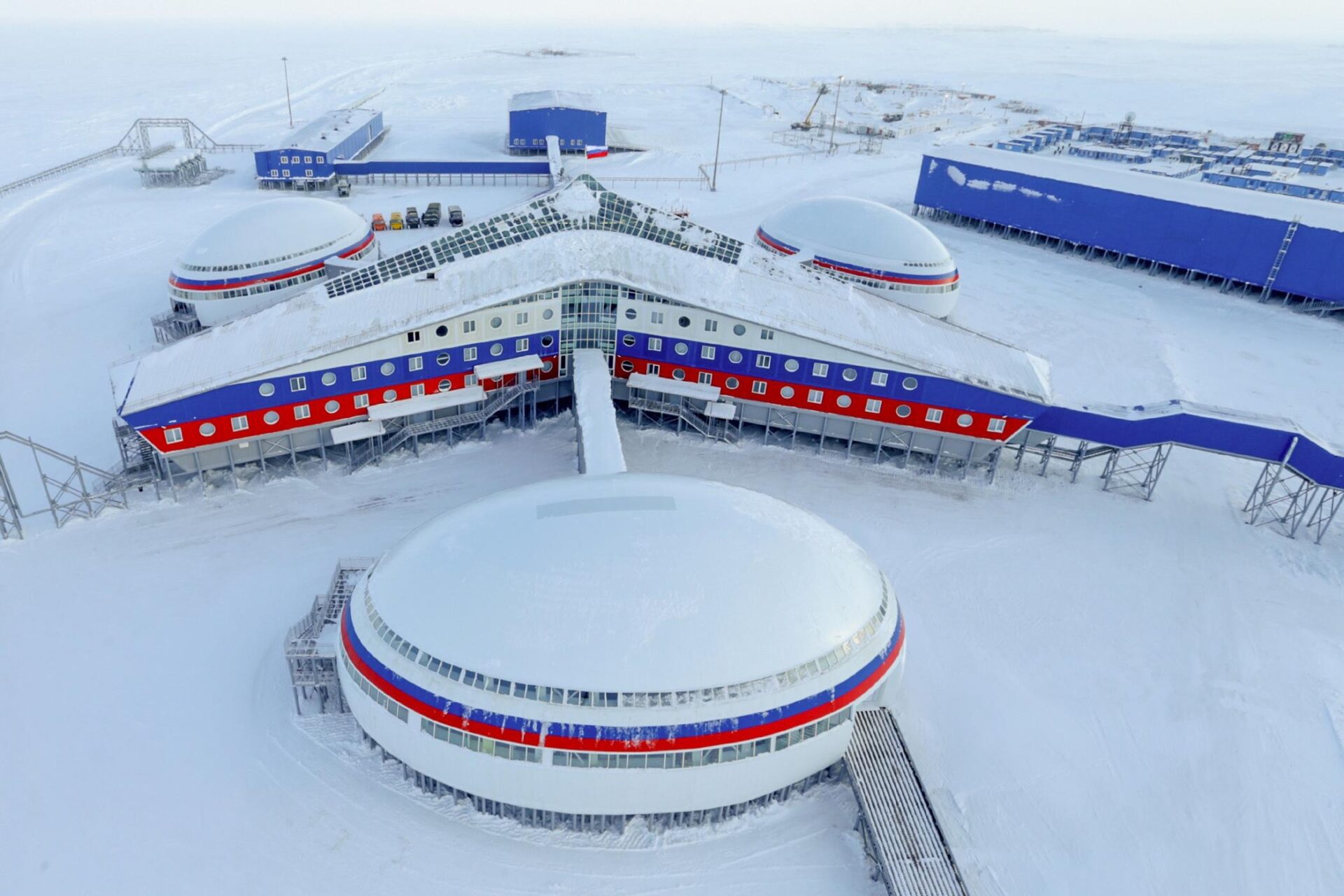
Secessionist Leaders in Ukraine’s East Step up Political Demands in the Wake of Elections
Secessionist Leaders in Ukraine’s East Step up Political Demands in the Wake of Elections
The armistice agreements, signed on September 5 and 19–20, remain basically unimplemented on the Russian side, politically and militarily. Russia’s proxy forces have “de-escalated” their attacks on Ukrainian positions, but continue attacking at a lower level of intensity, inflicting Ukrainian casualties. Russia itself is far from fulfilling the armistice provisions on force disengagement and withdrawal, border security, and international monitoring. These proxy forces retain the full capacity to scale up hostilities against Ukraine, with cross-border support from Russia, depending on opportunities.
Politically, the “presidential and legislative elections” just held in the Donetsk and Luhansk “people’s republics” have breached the armistice protocol with irreparable effects. Those elections, staged on November 2, have pre-empted the local elections that were to be held in the same territory on December 7, under Ukrainian electoral legislation and in line with the September 5 armistice protocol (see EDM, November 5).
That document had set the stage for holding local elections in Russian-controlled areas (referenced as “individual districts”) of Ukraine’s Donbas. Under the protocol’s point 3, Ukraine would enact a “law on the procedure of local self-administration in individual districts of the Donetsk and Luhansk provinces.” Under point 9, “local elections [were] to be held in accordance with [that] Ukrainian law” in those districts (osce.org, September 6).
Thus, the armistice protocol recognized, at least on paper, the supremacy of Ukrainian law in the Russian-controlled territory. The elections were to be held for lower-level local councils. There was no question of holding “presidential” or “legislative” elections of the “DPR” and “LPR.” Such an interpretation was ruled out, if only because Ukrainian legislation (both pre-existing and new) would rule out those sorts of elections.
Ukraine adopted that new law on September 16 (see EDM, September 19, 23) and brought it into force on October 18, for application in the Russian-controlled territory. The law’s intent was to devolve substantial powers to elective councils at the district, city, town and village levels (not to “DPR’s” and “LPR’s” “central” authorities). Under this law, elections to district, city, town and village councils were to be held in the Russian-controlled areas on December 7, in line with Ukraine’s existing legislation on local elections.
This implied a political quid-pro-quo. Kyiv would yield certain sovereign prerogatives de facto to those lower-level councils. It expected the Russian side to recognize Ukrainian sovereignty de jure by allowing local elections to be held within Ukraine’s legal framework. That was also the logic of Ukraine’s Western partners (foremost Germany), who expected Moscow to “influence” its proxies and allow those elections to be held. This could have preserved a minimal appearance of Russian compliance with Ukraine’s sovereignty, thus sparing the European Union another hard debate over sanctions on Russia. Hence, Germany worked on Kyiv to bring this law into effect, in time for delivering it to Russian President Vladimir Putin at the Milan summit on October 16–17.
The Kremlin had pressed Kyiv to enact this law from entirely different calculations. Moscow envisages a “special status” as a first step toward autonomy or federalization for the Russian-controlled territory, or more widely for “south-eastern Ukraine.” Putin welcomed Kyiv’s enactment of this law as a move in the right direction, although still insufficient in his view (Interfax, October 17; see EDM, October 22).
Moscow had timed “DPR” and “LPR” “elections” for November 2 as a counterblow to Ukraine’s October 26 parliamentary elections. Moscow could no longer contest the Ukrainian government’s legitimacy with any degree of plausibility after October 26. Accordingly, it moved to set up “elected” leaderships and state structures in those two “republics.” Moscow now claims that the “DPR” and “LPR” leaderships hold legitimate mandates to negotiate with Ukraine’s central government, whether directly or in mediated formats.
Based on these “elections,” the “DPR” and “LPR” are now moving to revise the armistice protocol, and the overall basis for negotiations, in their favor (Interfax, RIA Novosti, November 3–5; dnr.today/news, lugansk-online.info, November 5, 6).
The newly elected leaders, Aleksandr Zakharchenko and Igor Plotnitsky, demand “a new status,” to be negotiated with Kyiv on a “co-equal basis” (ravnopravie), bilaterally and in the framework of the “Contact Group” (”Minsk Group”).
These leaders are no longer interested in the Ukrainian “law on the procedure of local self-administration in individual districts of the Donetsk and Luhansk provinces,” which Kyiv had designed for selective application to lower-level administrative units (see above). Instead, “DPR” and “LPR” leaders now demand that Ukraine “recognize the special status of the Donbas by a legislative act”—“Donbas” implying the compact territory of both “peoples’ republics.” Furthermore they assert that “no Ukrainian law will henceforth operate on ‘DPR-LPR’ territory unless approved by their elected authorities.” The two “republics” will soon enact their own “laws” on local elections in their subordinated administrative units, and will stage those elections. This is a further breach of the armistice protocol, which stipulated local elections to be held under Ukrainian law in the Russian-controlled areas on December 7.
Donetsk and Luhansk now propose revising the September 5 armistice protocol in a way that would signify their recognition de facto by Kyiv. This proposal derives from their September 1 position paper that proved to be a non-starter in the Minsk negotiations. Ukraine would recognize a “special status for the territories under ‘DPR-LPR’ control,” as well as recognize the results of elections held there. In return, the two “republics” would “support peace and preserve Ukraine’s single economic, cultural, and political space,” as part of an “overall space of the Russian-Ukrainian civilization.” They would also enter into contractual relations with Ukrainian government- and province-level authorities, in return for political recognition. They intend to propose this at the next session of the Contact Group (comprised of Ukraine, Russia, the Organization for Security and Cooperation in Europe—OSCE, and the two “republics”) (dnr.today/news, lugansk-online.info, November 5, 6).
Following the November 2 “elections,” held in breach of the armistice protocol and Ukrainian law, Ukrainian President Petro Poroshenko moved to abrogate the law on “local self-administration in individual districts of the Donetsk and Luhansk provinces.” Poroshenko’s announcements on November 4–5 (Ukrinform, November 5) did not, however, trigger the “DPR”-“LPR” demands for status, recognition, and revision of armistice terms. The two “republics” were already airing those demands at full throttle, and Poroshenko’s move was purely reactive.
The “DPR-LPR elections” and ensuing demands have practically nullified the armistice agreement’s value in terms of upholding Ukraine’s territorial integrity. Russia had successfully ruled out that principle from the text. Kyiv and its Western partners, however, felt that local elections held under Ukrainian law in the “DPR-LPR” would serve to confirm Ukraine’s jurisdiction there, at least on paper.
This calculation failed to anticipate Moscow’s and its proxies’ response. The US, German and other governments deplore this breach of the armistice agreement in their public statements, but have not given up hopes to patch it up. The September 5 protocol is seen to be in tatters, but remains the only existing political basis for the armistice. Hence, Ukraine calls for the resumption of the Geneva format of negotiations to supersede the Russian-dominated Minsk format.


